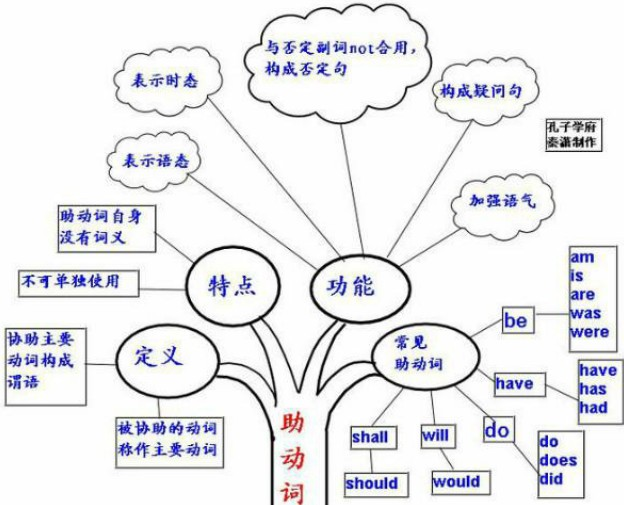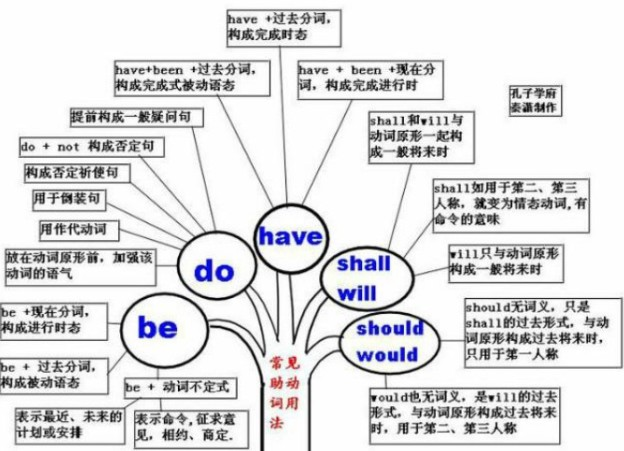本试题 “An accident ______ happen in the street a week ago.[ ]A. doesB. didC. doD. had to” 主要考查您对助动词
强调句
等考点的理解。关于这些考点您可以点击下面的选项卡查看详细档案。
- 助动词
- 强调句
助动词的概念:
助动词是帮助主要动词构成各种时态,语态,语气以及否定或疑问结构的动词。助动词分为时态助动词和结构助动词两种。
助动词的用法:
1、助动词be的用法:
1)be+现在分词,构成进行时态。
例如:They are having a meeting. 他们正在开会。
English is becoming more and more important. 英语现在越来越重要。
2)be+过去分词,构成被动语态。
例如:The window was broken by Tom. 窗户是汤姆打碎的。
English is taught through out the world. 世界各地都教英语。
3)be+动词不定式,可表示下列内容:
a. 表示最近、未来的计划或安排。
例如:He is to go to NewYork next week. 他下周要去纽约。
We are to teach the freshmen. 我们要教新生。
说明:这种用法也可以说成是一种将来时态表达法。
b. 表示命令。
例如:You are to explain this. 对此你要做出解释。
He is to come to the office this afternoon. 要他今天下午来办公室。
c. 征求意见。
例如:How am I to answer him? 我该怎样答复他?
Who is to go there? 谁该去那儿呢?
d. 表示相约、商定。
例如:We are to meet at the schoolgate at seven tomorrow morning. 我们明天早晨7点在校门口集合。
2、助动词have的用法:
1)have+过去分词,构成完成时态。
例如:He has left for London. 他已去了伦敦。
By the end of last month, they had finished half of their work. 上月未为止,他们已经完成工作的一半。
2)have+been+现在分词,构成完成进行时。
例如:I have been studying English for ten years. 我一直在学英语,已达十年之久。
3)have+been+过去分词,构成完成式被动语态。
例如:English has been taught in China for many years. 中国教英语已经多年。
3、助动词do的用法:
1)构成一般疑问句。
例如:Do you want to pass the CET? 你想通过大学英语测试吗?
Did you study German? 你们学过德语吗?
2)do+not构成否定句。
例如:I do not want to be criticized. 我不想挨批评。
He doesn't like to study. 他不想学习。
In the past, many students did not know the importance of English. 过去,好多学生不知道英语的重要性。
3)构成否定祈使句。
例如:Don't go there. 不要去那里。
Don't be so absent-minded. 不要这么心不在焉。
说明:构成否定祈使句只用do,不用did和does。
4)放在动词原形前,加强该动词的语气。
例如:Do come to my birthday party. 一定来参加我的生日宴会。
I did go there. 我确实去那儿了。
I do miss you. 我确实想你。
5)用于倒装句。
例如:Never did I hear of such a thing. 我从未听说过这样的事情。
Only when we begin our college life do we realize the importance of English. 进了大学以后,我们才认识到英语的重要性。
说明:引导此类倒装句的副词有never, seldom, rarely, little, only, so, well等。
6)用作代动词。
例如:—Do you like Beijing? 你喜欢北京吗?
—Yes, I do. 是的,喜欢。(do用作代动词,代替like Beijing.)
He knows how to drive a car, doesn't he? 他知道如何开车,对吧?
4、助动词shall和will的用法:
shall和will作为助动词可以与动词原形一起构成一般将来时。
例如:I shall study harder at English. 我将更加努力地学习英语。
He will go to Shang hai. 他要去上海。
说明:在过去的语法中,语法学家说shall用于第一人称,will只用于第二、第三人称。现在,尤其是在口语中,will常用于第一人称,但shall只用于第一人称,如用于第二、第三人称,就失去助动词的意义,已变为情态动词。
试比较:He shall come. 他必须来。(shall有命令的意味。)
He will come. 他要来。(will只与动词原形构成一般将来时。)
5、助动词should,would的用法:
1)should无词义,只是shall的过去形式,与动词原形构成过去将来时,只用于第一人称。
例如:I telephoned him yesterday to ask what I should do next week. 我昨天给他打电话,问他我下周干什么。
比较:"What shall I do next week?" I asked. “我下周干什么?”我问道。
可以说,shall变成间接引语时,变成了should。
2)would也无词义,是will的过去形式,与动词原形构成过去将来时,用于第二、第三人称。
例如:He said he would come. 他说他要来。
比较:"I will go," he said. 他说:“我要去那儿。”变成间接引语,就成了He said he would come。原来的will变成would,go变成了come。
助动词知识体系:

常见的助动词用法解析:

强调句的概念:
强调句 (The Emphatic Pattern) 是一种修辞,是人们为了表达自己的意愿或情感而使用的一种形式。通过各种方式对句子中的某个部分进行强调,从而起到修辞的作用。英语常用的强调结构有:It is (was)+被强调部分(主语、宾语或状语)+that/who...;what…be…句型;
强调句的使用:
一、强调句句型:
1、用It is/was...that/who...句型表示强调。
(1)陈述句的强调句型:It is/was+被强调部分(通常是主语、宾语或状语)+that/who(当强调主语且主语指人)+其它部分。
e.g. It was yesterday that he met Li Ping.
(2)一般疑问句的强调句型:同上,只是把is/was提到it前面。
e.g. Was it yesterday that he met Li Ping?
(3)特殊疑问句的强调句型:被强调部分(通常是疑问代词或疑问副词)+is/was+it+that/who+其它部分?
e.g. When and where was it that you were born?
注:被强调的部分(通常是句子的主语、状语、宾语或宾语补足语)放在is/was的后面,如被强调的是人,则后面可用who,whom等代替。
如:原句:He met an old friend in the park yesterday.
强调主语:It was he who/that met an old friend in the park yesterday.
强调宾语:It was an old friend that/who he met in the park yesterday.
强调地点状语:It was in the park that he met an old friend yesterday.
强调时间状语:It was yesterday that he met an old friend in the park.
2、用助动词do, does或did来强调谓语动词。
如:Do come early.
He did send you a letter last week.
We're pleased that she does intend to come.
3、用主语从句+be+被强调部分,主语从句常用what引导。
如:What John wants is a ball.
What Mary does every day is(to) give piano lessons.
二、not...until...句型的强调句:
1、句型为:It is/was not until+被强调部分+that+其它部分:
e.g. 普通句:He didn't go to bed until/till his wife came back.
强调句:It was not until his wife came back that he went to bed.
2、注意:此句型只用until,不用till。但如果不是强调句型,till, until可通用;
因为句型中It is/was not...已经是否定句了,that后面的从句要用肯定句,切勿再用否定句了。
三、谓语动词的强调:
1、It is/was...that...结构不能强调谓语,如果需要强调谓语时,用助动词do/does或did。
e.g. Do sit down.务必请坐。
He did write to you last week. 上周他确实给你写了信。
Do be careful when you cross the street. 过马路时,务必(千万)要小心啊!
2、注意:此种强调只用do/does和did,没有别的形式;过去时用did,后面的谓语动词用原形。
使用强调句型有以下几点请注意:
①强调句的谓语is或was永远用单数。
如:It was yesterday that I met your father in the street.
②不管被强调部分是哪种状语,只能用that连接,不得使用where、when等连词。
如:It was in the street that I met your father yesterday.
③被强调部分为人时,可用who(主格或宾格)和whom(宾格)代替that,用that也行。
如:It was your father that/whom/who I met in the street yesterday.
It was I that/who met your father in the street yesterday.
④强调句中也要注意主谓一致、人称一致和否定转移的问题。
如:It is they who are our friends.
It was not until ten o'clock that we got home last night.
⑤注意不要混淆强调句和其他从句。It is/was...that...为强调句标志,去掉后仍可组成一个完整的句子,只是没被强调,而其他从句一般不具备这一特征。
比较:1)It was ten o'clock when we got home last night. 我们昨晚到家时已十点了。
2)It was at ten o'clock that we got home last night. 我们昨晚是在十点到家的。
第一句不是强调句,when不可改为that,因为去掉it was和that后,只能组成“We got home ten o'clock last night.”这样一个不完整的句子;第二句是强调句,that不可改为when。
强调句型用法拓展:
1、句首词用“It”,不能用“This”,“That”等。
2、be动词的形式是is或was,不能用复数形式are或were。若原句的谓语动词用了现在时或将来时,则用is;
若原句的谓语动词用了过去时或过去完成时,则用was。
如:It___the Chinese women that___a great role in the socialist construction.
A. is; plays
B. are; play
C .is; play
D. are; plays
答案:C
3、被强调的部分如果是代词,强调主语用主格,强调宾语用宾格。
如:It is him that/who/whom I met in the street yesterday.
It is I who/that am wrong.
4、连接词一般用that,当强调部分是人时,既可用that也可用who。特别注意当强调部分是时间状语或地点状语时,不能用when或where。
如:It was on Oct1st, 1949 that People's Republic of China was founded.
It was at the gate____he told me the news.
A. that
B. what
C. which
D. when
答案:A
5、主谓一致问题被强调的主语要和that后面的谓语动词在数上保持一致。
如:It is Mary who often _____(help) me with my English. (helps)
It is I that ____(be) against you. (am)
6、not...until结构的强调。
强调“not...until”引导的时间状语时,要用“it is/was not until...that...”结构,that后面的句子要用肯定式,且须用陈述句语序。
如:We did not get off the bus until it stopped. ?
It was not until it stopped that we got off the bus. (注意:强调该结构时not until不能分开)
与“An accident ______ happen in the street a week ago.[ ]A. ...”考查相似的试题有:
- _______ is not the story itself but the lovely characters in it _______ make children interested in the cartoon.A.It...
- It was on the festival occassions _____ the family got together _____ he missed his family.[ ]A. where ; thatB. where...
- It was not until midnight_______they reached the small village.[ ]A. thatB. whenC. whileD. after
- It was _____ he said _____ made me happy.[ ]A. what, thatB. that, whatC. who, whereD. that, that
- It was ________ he came back from Africa that year ________ he met the girl he would like to marry.[ ]A. when; thenB....
- It was with great joy _____ he received the news that his lost daughter had been found.[ ]A. becauseB. whichC. sinceD...
- It was only when I reread his poem recently ________ I began to appreciate their beauty.A.untilB.thenC.thatD.so
- It is what you do rather than what you say matters.[ ]A.thatB.whatC.whichD.this
- It was last night ______ I saw the accident.A.whenB.thatC.whoD.which
- It is in this very village ______ she will build her first school, ______ inspires everyone to help her.[ ]A. where; ...